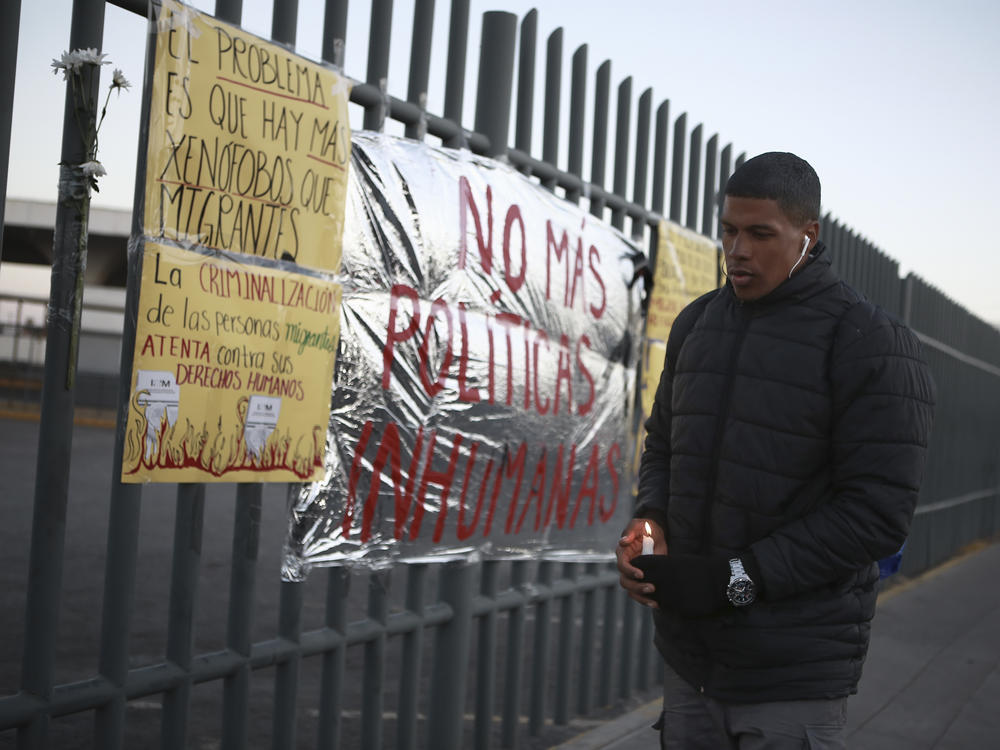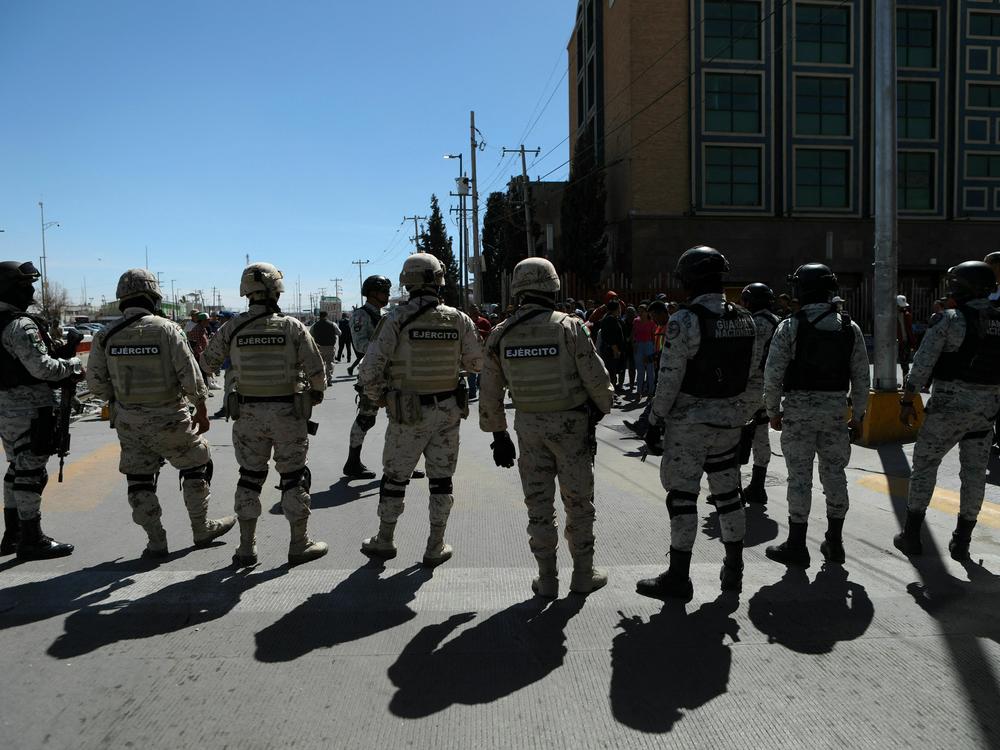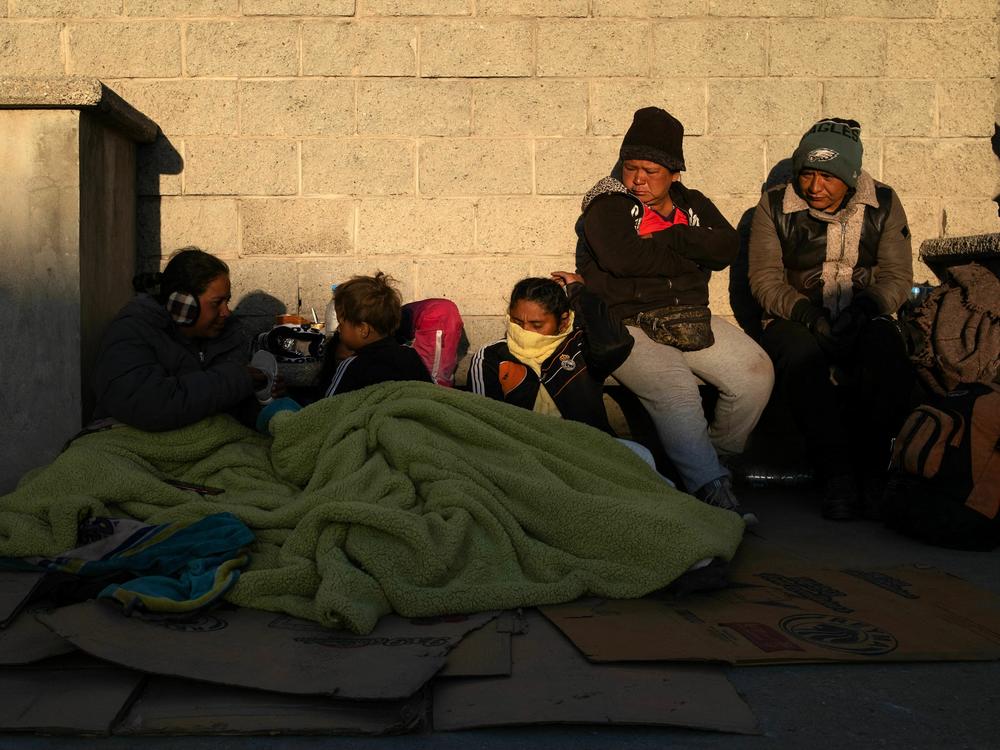Section Branding
Header Content
The Ciudad Juárez detention fire shows inhumane conditions for migrants, advocates say
Primary Content
A surveillance video of the fire that killed at least 40 people at an immigration processing center in Ciudad Juárez on Monday night appears to show detainees trapped in a locked cell as uniformed immigration agents are seen walking away.
Over the 32-second clip, officials appear to ignore the men behind bars, as well as the flames that are quickly engulfing them. No agents attempts to free the men, some of whom can be seen kicking and yanking on a cell door before the screen is completely obscured by dense smoke.
Still, the footage is brief, and though it's unclear what happened before or after the clip, it is haunting.
Mexican authorities announced on Wednesday that eight security guards and officials are being investigated for possible misconduct.
In many respects the incident encapsulates what migrant advocates say are the inhumane conditions created in the border city due to decades of failed immigration policies by the U.S. and Mexico. Those conditions have only been exacerbated by Title 42, a Trump-era policy that invokes a public health rule to push asylum seekers out of the U.S. and into Mexico, regardless of whether they might qualify for asylum.
The policy is set to expire on May 11, per a Supreme Court ruling. While the Biden administration has been pushing for an end to it, officials are rolling out plans that would continue to restrict migrants' access to asylum for those who show up at the southern border without first seeking protection in a country they passed through.
U.S. policies have created a loop for asylum seekers and overwhelmed resources
Tania Guerrero, a lawyer with the Catholic Legal Immigration Network who has worked in Juárez, told NPR that as the United States tightened asylum policies, the safety of migrants was deemphasized.
She added that the deadliness of Monday's fire can be traced back to these policies, which have evolved to allow Mexican officials in Juárez to conduct regular roundups of mostly men and detaining them in makeshift facilities that were never intended to house migrants, including the center where the fire broke out.
"The U.S. and Mexican governments have prioritized the deterrence, the criminalization, the militarization, the discrimination versus the well-being of those seeking protection," Guerrero said.
Since it was first implemented in 2020, the government has used Title 42 to expel migrants from the U.S.-Mexico border nearly 2.7 million times. That has created a loop in which the U.S. government returns thousands of displaced people on a daily basis to some of Mexico's most dangerous border cities, leaving them stranded until they can try to cross again.
The influx has overwhelmed shelters in Juárez and put intense strain on what little infrastructure is in place to deal with the constant deluge of new arrivals. That leaves migrants — mostly from Venezuela, Guatemala, Honduras and Haiti — subject to kidnapping, extortion and violence while they remain in limbo.
"The United States is pushing for other countries, and in this case Mexico, to house and to actually even create obstacles [for asylum seekers] to be able to reach safety," Guerrero said.
Law enforcement is accused of abuse and violence against migrants
The ripple effects of the current policies have transformed nearly every aspect of daily life in the city, particularly the downtown area. Street corners, parks and plazas are teeming with desperate people begging for food and money as they jostle for asylum appointment openings on the government's new smartphone application, which has been rife with bugs since it was rolled out.
"What stands out is the extreme vulnerability of the migrants – not just to coyotes who want to exploit them but from Mexican law enforcement, too," Howard Campbell, a cultural anthropologist from the University of Texas El Paso, told NPR, using the term for human smugglers.
Campbell is the author of Downtown Juárez: Underworlds of Violence and Abuse and has been researching and writing about the city for more than three decades.
In recent months, the Mexican National Guard has sent hundreds of additional troops to Juárez, according to Campbell.
"There are soldiers all over the place and especially close to the immigration area [nearest the border]," he said, adding that they walk around holding automatic weapons, or ride around on trucks mounted with machine guns.
The militarized presence has only intensified tensions on the ground. "And that's what people, mostly the Venezuelans, are pushing up against," Campbell explained.
Earlier this month, dozens of migrant advocacy groups urged the city to investigate what they deem abuses by police and immigration officials in an open letter. It accused authorities of abusing migrants and using excessive force in rounding them up, often to keep them from begging on the streets. It said municipal police stopped people without cause to question them about their immigration status. In some instances, the groups allege, police extorted and stole money from them and destroyed their documents.
According to family members who spoke to NPR, many if not all of the men killed in the fire were detained at the immigration facility in a similar roundup by local police and immigration authorities.
A day before the letter was made public, the National Guard, National Migration Institute immigration police and about 50 local police officers attempted to raid a hotel in Juárez that's home to mostly Venezuelan migrants. Local news outlets reported that "the migrants, mostly young men, threw stones" at officials and a brawl ensued. Campbell said that authorities eventually abandoned their mission.
In another incident described in the letter, and corroborated in interviews by Campbell, authorities raided a church and dragged off a number of Venezuelan migrants who had been given sanctuary there. Some, Campbell said, were beaten "and essentially tortured."
About a week later, hundreds of protesting migrants stormed the Paso del Norte international bridge, leading into El Paso, Texas, shutting down the port of entry for several hours.
In response, Juárez Mayor Cruz Pérez Cuéllar pledged to launch a widespread crack down to curb further disruptions and panhandling.
"The truth is that our patience level is running low," he said, noting that the demonstration had impacted the economies of Juárez, El Paso and Las Cruces, N.M.
Anti-immigrant sentiments are spreading
Campbell said the mayor's comments reflect yet another shift in Juárez: local residents' changing, less tolerant attitudes toward immigrants.
Juárez has always served as a final stop along the path for people to the U.S. For much of Mexican history, that has meant mostly Mexicans from further south traveling through as they head for jobs in American factories or farm fields. Central and South Americans have also historically traversed the city on their way to the U.S. but in much smaller numbers until recent decades.
Campbell said that created a culture where the local population has been at best welcoming to those passing through and, at worst, indifferent. That sort of attitude held steadfast even as massive caravans of migrants from Central and South America began appearing about six years ago.
But with the arrival of Cuban immigrants in 2018, things began to shift, according to Campbell.
"They stood out a great deal, because many of them actually established businesses in downtown quarters and had a kind of cultural presence in the city," he said, adding that within their new enterprises many displayed Cuban flags and played Cuban music on the streets. "And that just seemed to rub people the wrong way."
Previously, arriving immigrants stayed on the margins of local life and tried to blend in, he explained.
Then suddenly, the Cubans seemed to vanish. More than 220,000 Cubans migrated to the U.S. in the 2021-2022 fiscal year. Not long afterward, Title 42 was expanded to apply to Cuban migrants.
By then they were replaced by masses of much poorer asylum seekers, including Haitians. "They stood out dramatically because almost all of them are very dark skinned people with few resources and they speak Creole or French so they don't blend into the population much," Campbell said.
Most recently, the city population has swelled with extremely poor Venezuelans. Campbell said local residents complain that they feel outnumbered by the South Americans, who they believe also look different and speak Spanish with very different accents.
"It's a dramatic migrant situation that is probably analogous to what happened in Europe a few years ago with people coming from Syria and other countries in the Middle East," Campbell said. "They are desperate people with no resources at all, mostly young women and men with children."
The deluge has been so overwhelming that people who were once sympathetic are now saying that they are a drain on the local government, resources and the economy.
Campbell noted that anti-immigrant rhetoric is also spilling over into the local media. He said he has observed a rise in stories about foreign men allegedly harassing women.
Following the demonstration on the bridge a couple weeks ago, the mayor urged residents not to give money to migrants who are on the city's streets, saying many don't want to work because they get more money from panhandling.
The municipal Secretary of Public Security César Omar Muñoz Morales said that women have complained about feeling "intimidated by migrants" when they're traveling along. He said the government will launch a campaign focused on migrants and sexual harassment.
The end of Title 42
With the end of the national COVID-19 emergency declarations in the U.S. about six weeks away, it is still unclear how things will change on the ground in Juárez, or if it will improve conditions for asylum seekers who have been trapped across the border.
The Biden administration, which expanded Title 42 to expel Venezuelans and deport thousands of Haitian refugees, has said it will deny entry to any asylum seekers that have not previously applied for asylum in another country they might have passed through.
And as NPR reported, the administration is considering whether to revive the practice of detaining migrant families caught crossing the U.S.-Mexico border illegally, at least for short periods of time.
Copyright 2023 NPR. To see more, visit https://www.npr.org.



